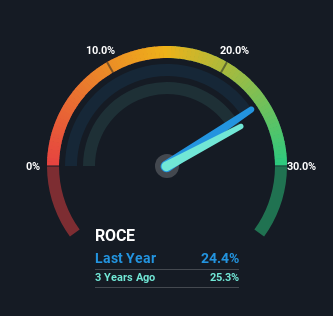- Hong Kong
- /
- Construction
- /
- SEHK:9979
Greentown Management Holdings (HKG:9979) Will Want To Turn Around Its Return Trends
Finding a business that has the potential to grow substantially is not easy, but it is possible if we look at a few key financial metrics. Typically, we'll want to notice a trend of growing return on capital employed (ROCE) and alongside that, an expanding base of capital employed. Basically this means that a company has profitable initiatives that it can continue to reinvest in, which is a trait of a compounding machine. Having said that, while the ROCE is currently high for Greentown Management Holdings (HKG:9979), we aren't jumping out of our chairs because returns are decreasing.
What Is Return On Capital Employed (ROCE)?
For those who don't know, ROCE is a measure of a company's yearly pre-tax profit (its return), relative to the capital employed in the business. Analysts use this formula to calculate it for Greentown Management Holdings:
Return on Capital Employed = Earnings Before Interest and Tax (EBIT) ÷ (Total Assets - Current Liabilities)
0.24 = CN¥934m ÷ (CN¥6.8b - CN¥3.0b) (Based on the trailing twelve months to June 2023).
So, Greentown Management Holdings has an ROCE of 24%. That's a fantastic return and not only that, it outpaces the average of 8.3% earned by companies in a similar industry.
View our latest analysis for Greentown Management Holdings

In the above chart we have measured Greentown Management Holdings' prior ROCE against its prior performance, but the future is arguably more important. If you'd like, you can check out the forecasts from the analysts covering Greentown Management Holdings here for free.
The Trend Of ROCE
On the surface, the trend of ROCE at Greentown Management Holdings doesn't inspire confidence. To be more specific, while the ROCE is still high, it's fallen from 52% where it was five years ago. However, given capital employed and revenue have both increased it appears that the business is currently pursuing growth, at the consequence of short term returns. And if the increased capital generates additional returns, the business, and thus shareholders, will benefit in the long run.
On a related note, Greentown Management Holdings has decreased its current liabilities to 44% of total assets. That could partly explain why the ROCE has dropped. What's more, this can reduce some aspects of risk to the business because now the company's suppliers or short-term creditors are funding less of its operations. Some would claim this reduces the business' efficiency at generating ROCE since it is now funding more of the operations with its own money. Keep in mind 44% is still pretty high, so those risks are still somewhat prevalent.
What We Can Learn From Greentown Management Holdings' ROCE
In summary, despite lower returns in the short term, we're encouraged to see that Greentown Management Holdings is reinvesting for growth and has higher sales as a result. Furthermore the stock has climbed 85% over the last three years, it would appear that investors are upbeat about the future. So should these growth trends continue, we'd be optimistic on the stock going forward.
One more thing, we've spotted 1 warning sign facing Greentown Management Holdings that you might find interesting.
If you'd like to see other companies earning high returns, check out our free list of companies earning high returns with solid balance sheets here.
New: Manage All Your Stock Portfolios in One Place
We've created the ultimate portfolio companion for stock investors, and it's free.
• Connect an unlimited number of Portfolios and see your total in one currency
• Be alerted to new Warning Signs or Risks via email or mobile
• Track the Fair Value of your stocks
Have feedback on this article? Concerned about the content? Get in touch with us directly. Alternatively, email editorial-team (at) simplywallst.com.
This article by Simply Wall St is general in nature. We provide commentary based on historical data and analyst forecasts only using an unbiased methodology and our articles are not intended to be financial advice. It does not constitute a recommendation to buy or sell any stock, and does not take account of your objectives, or your financial situation. We aim to bring you long-term focused analysis driven by fundamental data. Note that our analysis may not factor in the latest price-sensitive company announcements or qualitative material. Simply Wall St has no position in any stocks mentioned.
About SEHK:9979
Greentown Management Holdings
An investment holding company, provides project management services in the People’s Republic of China.
Excellent balance sheet and good value.
Market Insights
Community Narratives



